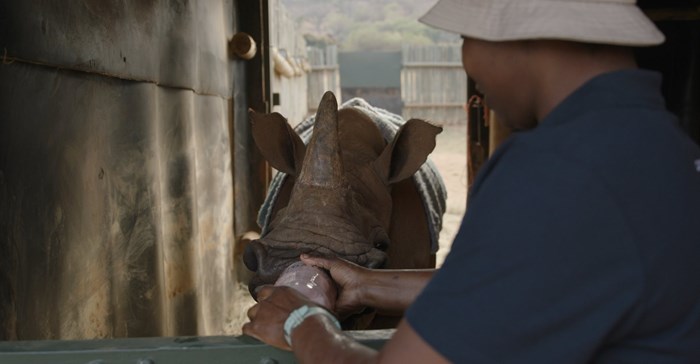This World Rhino Day, Sunday 22 September, the Mpumalanga community celebrated the decade of work the Care for Wild Rhino Sanctuary has dedicated to conserving South Africa’s black and white rhino population.

This World Rhino Day the Care for Wild Rhino Sanctuary celebrated 10 years of conserving South Africa’s black and white rhino population (Image supplied)
This World Rhino Day, Sunday 22 September, the Mpumalanga community celebrated the decade of work Care for Wild Rhino sanctuary has dedicated to conserving South Africa’s black and white rhino population.
This is also a 10-year milestone of the Care for Wild partnership with Investec.
The relentless efforts of its team, led by founder and CEO Petronel Niewoudt in protecting these highly endangered and intelligent creatures from poachers, has seen over 113 rhinos rescued and rehabilitated to date, including 51 rhinos rewilded and 29 calves born at sanctuary.
In 2023 alone, 499 rhinos were killed in South Africa, which is an increase of more than 10% compared with 2022.
Although this crisis extends across the African continent, progress is evident when we consider past figures - especially in 2014 - when a staggering 1,215 rhinos were poached in South Africa.
The signing of a Memorandum of Understanding (MOU) between Care for Wild and SANParks, where black and white rhinos from the Kruger National Park are rescued and brought to the sanctuary, was the crucial first step in the Care for Wild journey.
Niewoudt, who was recently nominated for the prestigious Indianapolis prize for animal conservation says the Care for Wild - Investec collaboration has not only contributed to the preservation of one of the world’s most vulnerable species to poaching, but has also sparked meaningful social development, transforming the lives of local communities through comprehensive conservation-driven initiatives.
Youth Employment Service programme
In a country where the youth unemployment rate sits at 3.6 million (35.2%) people, and out of the 10.3 million young people aged 15 to 24 years not in formal employment, education or training, creating opportunities is essential.
Six years ago Investec introduced the Youth Employment Service (Yes) programme to Care for Wild.
This business-led initiative, supported by government and labour, aims to directly address the youth unemployment crisis in South Africa.
Through the Yes programme, 814 unemployed youths have been given a one-year paid work experience at Care for Wild, 40% of whom have gone on to secure permanent positions at the sanctuary.
“These individuals are mentored and trained across various departments, including animal care, security, environmental management, and administration.
“This programme not only offers immediate employment but also equips participants with valuable skills and knowledge and helps pave the way for future careers in conservation and environmental management,” says Chris de Bruno Austin, board chairman at Care for Wild.
Austin explains that the collaboration is a sustainable conservation model, its own ‘eco-system’ of impact, that uplifts human livelihoods and tackles the root causes of rhino poaching.
“Ensuring basic needs like food, shelter, and education are met creates a community that is motivated and best equipped to protect its wildlife and South Africa’s natural heritage.
“The Yes programme, initiated by President Ramaphosa, is one of the most important contributors to the success of what we do here,” says Austin.
People at the heart of conservation
Niewoudt adds that throughout their mission to save the rhino, they have come to realise that people are truly at the heart of our conservation efforts.
However, the path to this understanding has been far from easy.
“Over the years, I’ve witnessed some of the most devastating cases of rhino poaching - heartbreaking moments that kept me awake at night.
“This journey has taught me one invaluable lesson: resilience in the face of adversity. We cannot allow poachers to believe they have won, and for that reason, I will continue fighting this injustice,” he adds.


































